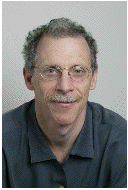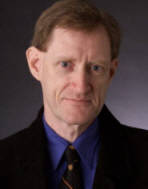 This summer, Owen said it this way:
This summer, Owen said it this way:
We have the human genome project, we have Google, we have social networks, we have contributions to many disciplines, and our own discipline, but we argue amongst ourselves about whether emacs is better than vi, Eclipse better than IDEA, C++ better than Java or Scheme, or what objects-first really means.Owen isn't as pessimistic as the provocative "We're doomed" sounds; he simply wants to cause us to think about this sea change and begin to make a change ourselves. I decided that this would make a great closing for my second Educators Symposium. Last year, my first symposium opened with Alan Kay challenging us all to set a higher bar for ourselves -- in computer science, and in computer science education. This year, my second symposium would close with a challenge to reinvent what we do as a discipline. As in so many things, the panel did not turn out quite the way I had planned. First of all, Owen wasn't able to be at OOPSLA after all, so we were without our intellectual driving force. Then, when the panel went live, discussion on the panel went in a different direction than I had planned. But it had its good points nonetheless. The panel consisted of Robert Biddle, Alistair Cockburn, Brian Marick, and Alan O'Callaghan. I owe special thanks to Alistair and Alan, who joined us on relatively short notice. As moderator, I had hoped to pen a wonderfully humorous introduction for for each of the panelists, to loosen things up before we dropped the gloves and got serious about changing the face of computer science. Perhaps I should have commissioned a master to ghostwrite, for in my own merely mortal hands my dream went unfulfilled. I did have a couple of good lines to use. I planned to introduce Robert as the post-modern conscience of the Educators Symposium, maybe with a visual bow to one of his previous Onward! presentations. For Brian, my tag line was to be "the panelist most likely to quote Heidegger -- and make you love him anyway". But I came up short for Alistair and Alan. Alistair's paper on software development as cooperative game playing was one possible source of inspiration. For Alan, all I could think was, "This guy has a higher depth/words ratio than most everyone I know". In the end, I played it straight and we got down to business rather quickly. I won't try to report the whole panel discussion, as I got sucked into it and didn't take elaborate notes. In general, rather than focusing on how CS is being reinvented and how CS education ought to be reinvented, it took a turn toward metaphors for CS education. I will describe what was for me the highlight of the session and then add a couple of key points I remember.I'm sorry, but if we don't change what we talk about amongst ourselves, we are doomed to a niche market while the biologists, the economists, the political scientists, etc., start teaching there own computational/modeling/programming/informatics courses. Nearly everyone turns to math for calculus, nearly everyone turns to math/stats for statistics. These are nearly universally acknowledged as basic and foundational for *lots* of disciplines. In the age of information nearly no discipline at a large scale requires computer science, certainly not programming as we teach it.
 The highlight for me was Robert's presentation, titled
"Deprogramming Programming". It drew heavily on the
themes that he and
James Noble
have been pitching at recent Onward! performances, in
particular that much of what we take as accepted wisdom
in software development these days is created by us and
is, all too often, just wrong.
He started with a quote from Rem Koolhaus and Bruce Mau's
"S, M, L, XL":
The highlight for me was Robert's presentation, titled
"Deprogramming Programming". It drew heavily on the
themes that he and
James Noble
have been pitching at recent Onward! performances, in
particular that much of what we take as accepted wisdom
in software development these days is created by us and
is, all too often, just wrong.
He started with a quote from Rem Koolhaus and Bruce Mau's
"S, M, L, XL":
Sous le pavé, la plage.There is something beneath what we have built as a discipline. We do not program only our computers... We've programmed ourselves, in many wrong ways, and it's time to undo the program.
(Under the paving stone, the beach.)
 The idea that there is a software crisis is a fraud.
There isn't one now, and there wasn't one when the
term 'software engineering' was coined and became a
seemingly unavoidable part of our collective psyche.
Robert pointed out that in Greek mythology
Narcissus
fell in love not with himself but with his reflection.
He believes that the field of software engineering has
done the same, fallen in love with an image of itself
that it has created. We in CS education are often guilty
of the same offense.
Robert then boldly asserted that he loves his job as
a teacher of computing and software development. If we
look under the pavement, we will see that we developed
a lot of useful, effective techniques for teaching
students to build software: study groups, role play,
and especially case studios and studios. I have written
before about my own strong belief in the value of case
studios and software studios, so at this point I nearly
applauded.
Finally:
The idea that there is a software crisis is a fraud.
There isn't one now, and there wasn't one when the
term 'software engineering' was coined and became a
seemingly unavoidable part of our collective psyche.
Robert pointed out that in Greek mythology
Narcissus
fell in love not with himself but with his reflection.
He believes that the field of software engineering has
done the same, fallen in love with an image of itself
that it has created. We in CS education are often guilty
of the same offense.
Robert then boldly asserted that he loves his job as
a teacher of computing and software development. If we
look under the pavement, we will see that we developed
a lot of useful, effective techniques for teaching
students to build software: study groups, role play,
and especially case studios and studios. I have written
before about my own strong belief in the value of case
studios and software studios, so at this point I nearly
applauded.
Finally:
The ultimate goal of computer science is the program.This quote is in someways antithetical to the idea Owen and I were basing the panel on (which is one reason I wanted Robert to be on the panel!), but it also captures what many folks believe about computing. I am one of them. That certainly doesn't do justice to the stark imagery and text that constituted Robert's slides, nor to the distinctive verbal oratory that Robert delivers. But it does capture some of the ideas that stuck with me. The rest of the panel presentations were good, and the discussion afterward ranged far and wide, with a recurring them of how we might adopt a different model for teaching software development. Here are a few points that stood out: